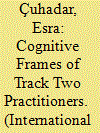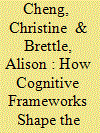|
|
|
Sort Order |
|
|
|
Items / Page
|
|
|
|
|
|
|
| Srl | Item |
| 1 |
ID:
176506


|
|
|
|
|
| Summary/Abstract |
This article explores the extent to which framing affects Track Two diplomacy practice and especially how the cognitive frames used by practitioners shape the design of their interventions. The framing effect is pervasive and shapes every type of action. Peacebuilding and Track Two work are no exception. Track Two practitioners often rely on frames as cognitive heuristics when they design their interventions. This article reports on the results of an online survey of 273 participants, using measures based on categories identified in two previous qualitative studies using the grounded theory approach. Four main frames used by practitioners are presented, along with examples from practice: psychologists, constructivists, capacity-builders, and realistic negotiators. Finally, the implications of being captive to the framing effect for Track Two practice are discussed. Steps are suggested towards making more deliberative and reflective context-specific decisions about interventions rather than “fast thinking” based on heuristics and bias.
|
|
|
|
|
|
|
|
|
|
|
|
|
|
|
|
| 2 |
ID:
167665


|
|
|
|
|
| Summary/Abstract |
Why do American perspectives of international relations (IR) continue to hold sway over an increasingly diverse discipline? What actually constitutes “Americanness” in IR? Who is considered “American” in IR? These are the central questions we explore in this essay. Drawing on cognitive and behavioral insights from social psychology, we argue that there is a distinct “American approach” to international relations and security studies and that this approach is a product of Western cognitive frames. We identify three factors that represent the American approach's hyper-Westernized framing: individualism, equality, and a preference for causal rather than contextual analysis, and a preference for egalitarianism. We argue that these are reinforced by two social identity processes—academic identity and national identity. The consequences of “being American” in IR and security studies suggest not only problems of attention and accuracy, but an inherent failure to appreciate that Western—and particularly, American—ways of seeing and valuing the world are not universal.
|
|
|
|
|
|
|
|
|
|
|
|
|
|
|
|
| 3 |
ID:
180281


|
|
|
|
|
| Summary/Abstract |
The European Union (EU)–Turkey deal consolidated a shift in the EU’s migration policy. The deal is the culmination of the dominance of the security frame and depicts the continuous externalization of the EU’s responsibility of asylum protection and burden sharing. The strengthening of the security frame has weakened the humanitarian norms that previously dictated EU’s behaviour. This has led to the EU losing some of its comparative advantages in negotiations. Simultaneously, the instrumentalization of the value of asylum, paired with an increased number of asylum seekers, has given negotiation leverage to the neighbouring countries turned service providers. These changes in perception and norms have created a power shift, at the disadvantage of the EU, creating a more leveled playing field for negotiations between the parties. This article tracks the historical shifts in the global refugee regime to explain how today’s situation was created. Hereby, the existence of two competing cognitive frames—humanitarian and security—is assumed, tracked and analysed. While looking at the EU–Turkey deal, the article shows that the EU has started treating refugees as a security problem rather than a humanitarian issue, breaking the normative fabric of the refugee regime in the process. The article also displays how Turkey was able to capitalise on this new reality and engage with negotiations of other neighbouring countries of EU that point towards a change of dynamics in the global refugee regime.
|
|
|
|
|
|
|
|
|
|
|
|
|
|
|
|
| 4 |
ID:
176027


|
|
|
|
|
| Summary/Abstract |
The endeavour to explain and predict international affairs is getting harder since it is ever more widely accepted that heterogeneous and fluid actors are making international politics. Positivists of various types have dominated the discussion on knowledge creation in the discipline of International Relations (IR), but the increasing acceptance of the dynamic character of international politics has led to the support and use of constructivist, post-Western or feminist approaches. There has also been an uptick in methodological discussions on these critical, non-positivist approaches. This article contributes to these debates by offering the first steps towards a cognitive frames–based methodology for IR. With a pragmatist ontology as its foundation, the approach re-sets the focus of analysis to the rationality of the international actors. The article, offers an initial description, by relying on illustrative examples, of the creation, the reach, durability and the organisational structure of cognitive frames in the global arena.
|
|
|
|
|
|
|
|
|
|
|
|
|
|
|
|
|
|
|
|
|